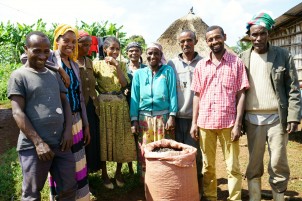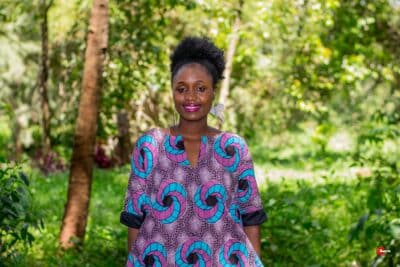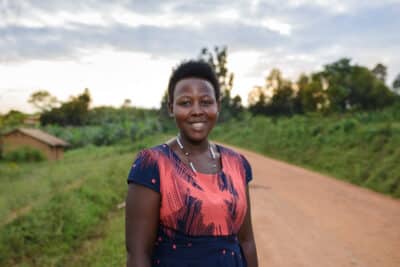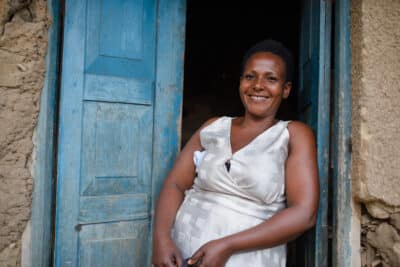Expert view
25 May 2016
How Ethiopia’s Arabica coffee is helping fight climate change

By Nicolas Mounard, CEO of Farm Africa
 I’ve long been in thrall to Arabica coffee. The fruity, light and slightly acidic taste with just a small note of chocolate. To me, and millions of coffee aficionados the world over, it’s a killer combination.
I’ve long been in thrall to Arabica coffee. The fruity, light and slightly acidic taste with just a small note of chocolate. To me, and millions of coffee aficionados the world over, it’s a killer combination.
And, like many others, I consider Ethiopian varieties to be the crème de la crème of Arabica. Working for Alter Eco in France six years ago, I used to import coffee from all over the world. And the Fairtrade and organic fully washed Arabica coffee we bought from the Sidama Farmer Union in Ethiopia was definitely one of our best-selling products, outperforming coffees from Peru, Bolivia, Mexico or Guatemala.
While its superior taste first sparked my passion for Ethiopian coffee, my love for Ethiopian Arabica has grown from the knowledge this crop is not only helping fight poverty in Ethiopia, but also helping tackle climate change.
 Global warming is starting to take its toll on Arabica coffee cultivation in many countries, as the plants are very sensitive to any temperature rises. While Ethiopia is relatively unaffected, countries such as Brazil, Vietnam, Indonesia and Columbia, who between them produce 65% of the world’s Arabica beans, have seen their harvests become increasingly vulnerable to pests and diseases.
Global warming is starting to take its toll on Arabica coffee cultivation in many countries, as the plants are very sensitive to any temperature rises. While Ethiopia is relatively unaffected, countries such as Brazil, Vietnam, Indonesia and Columbia, who between them produce 65% of the world’s Arabica beans, have seen their harvests become increasingly vulnerable to pests and diseases.
One way around this is to start growing coffee at higher altitudes, where temperatures are cooler. But in many countries this just isn’t possible – in harsh, rocky, volcanic regions there simply isn’t any fertile land to farm.
In the highlands of Ethiopia, coffee still grows wild in the lush green forests where Arabica first originated. But unfortunately, these forests are under threat from  land clearance for timber and agricultural expansion as forest communities struggle to make a living.
land clearance for timber and agricultural expansion as forest communities struggle to make a living.
Rising global appreciation for speciality coffee, and lower yields from other coffee-growing regions, means there’s a potentially lucrative market for the unique heirloom varieties found in Ethiopian forests.
Given a little support, forest communities in Ethiopia can earn a sustainable living from wild coffee. And thriving coffee businesses mean a built-in economic incentive to preserve the trees under which the coffee plants thrive, and therefore contribute to the reduction of deforestation and forest degradation that account for nearly 20% of global greenhouse gas emissions.
Farm Africa’s Coffee Is Life project in Oromia, Ethiopia promotes wild coffee harvesting – and is a great example of how Farm Africa works. We care deeply about both environmental conservation and making farming profitable. Because unless farmers can earn a decent wage from forests, why would they protect them?
And it’s by no means guaranteed that farmers will get a good price for their coffee beans: many Ethiopian coffee farmers scrape by on less than $1 a day, trapped in cycles of poverty where they are unable to plan for their futures.
 That’s why we supply coffee farmers with the equipment and training they need to grow the finest coffee and access the best markets. Not only does this help farmers to negotiate better incomes and grow their way out of poverty, it also means that whole communities can profit from a business that respects biodiversity. And forests don’t just provide coffee farmers with a better future, but all of us.
That’s why we supply coffee farmers with the equipment and training they need to grow the finest coffee and access the best markets. Not only does this help farmers to negotiate better incomes and grow their way out of poverty, it also means that whole communities can profit from a business that respects biodiversity. And forests don’t just provide coffee farmers with a better future, but all of us.
That’s why I’ll always love the taste of Ethiopian Arabica coffee. Because brewed right, it’s not just delicious, it’s a force for good.
Read more about Farm Africa’s Coffee is Life project at www.farmafrica.org/coffeeislife




